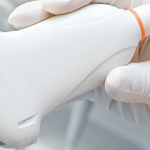I quickly glanced around and saw her bedside lunch tray containing a partially consumed chicken dish. BL had a panicked look. Her eyes were wide, her brow furrowed and her mouth stretched in what looked like a ghastly, stifled scream. She just needed to breathe!
I placed a stethoscope over her airway and heard a great deal of inspiratory turbulence. I got behind the chair where she was seated, pulled her up and performed a Heimlich maneuver. Nothing came out of the airway and nothing changed. I asked the senior medical resident, who had just contacted me, to call anesthesia. She hesitated.
It was easy to read the resident’s emotions. This patient was a DNR! We exchanged meaningful looks and held each others’ gaze for what seemed like an eternity; probably only seconds. A resolute look indicated she would call anesthesia. Now!
The anesthesiologist arrived quickly. BL was moved to the bed and a laryngoscope was placed in her pharynx. A forceps yielded a large, solid piece of chicken.
BL immediately resumed breathing normally. She experienced a glorious and immediately apparent sense of relief. She and her family were visibly joyful. The gratitude was unmistakable. Her husband and daughter also started to breathe again. There were visible tears of relief all around.
However, the senior medical resident, a woman I had interacted with favorably in other clinical scenarios, had now assumed the mantle of the distraught person in the hospital room. I could see by the look on her face that she had just witnessed a faulty outcome because of a flawed approach executed before her eyes by a medical attending. Why did we just save the life of a patient who had a terminal, incurable disease who was a DNR!?
After spending some time with my patient I asked the resident to accompany me to a quiet area on the hospital floor.
A Teaching Moment
We had both witnessed the immediate resolution and relief of an event that would indeed, if allowed to proceed to its natural conclusion, have hastened the final resolution of BL’s other very significant health burdens. The resident felt what I did was inappropriate. She was appalled that the natural course of events was not allowed to carry the patient forward to the expected outcome from her acute aspiration. She believed her medical duty was to not interfere.

